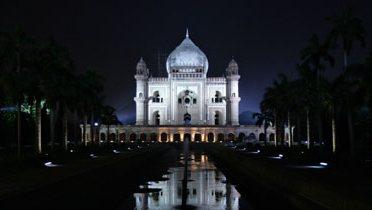Every visit to India is an eye-opening and enchanting experience for me, and my latest trip, in mid-March 2011 was no different. The pace of change in India is staggering, even if the poverty remains heart breaking. The change was apparent the minute you entered Indira Gandhi International Airport in New Delhi. What was formerly one of the world’s most chaotic, dirty and run down airports has been replaced with one of the most modern. Clean, spacious and efficient, it even boasts a food court with McDonalds and Subway outlets. The highway into the capital is new and fast, with a metro line about to open next to it.
The financial and film capital Mumbai also has a new modern highway linking the airport to downtown with a long extension over the Arabian Sea. The Taj Hotel, the railroad station and the other targets of the 26/11 terrorist attack have all been refurbished and renewed. A city held under siege in the worst terror attack since 9/11 is today recovered and as vibrant and alive as ever.
The new census also shows dramatic change. The population is now over 1,210,000 billion people. Literacy is going up fast. In 2001, it was 64 percent; today it is almost 75 percent, with female literacy rates rising as well.
My visit coincided with the start of the war in Libya. India abstained on UNSCR 1973 authorizing the use of force to protect Libyans from Qaddafi’s revenge. In New Delhi, they were quick to note that the states in “decline,” whose economies are struggling, (America, France and Britain) seem so eager for another war in the Islamic world, while the booming “rising” states like India, Turkey and China are much more reluctant warriors. They connect the fiscal dots.
The Indians are puzzled that some in the west who had embraced Qaddafi, like French President Sarkozy only a few months ago, are now so shocked by his cruelty. Qaddafi did not change in 2011. Some former Indian diplomats are quick to suggest that the Libyan war shows America’s “unreliability” and a tendency to overreact to the latest news broadcast. Who are the rebels in Benghazi, they ask, that are now your allies? Why do you rush to help them and not the Shia protesters in Manama? As one critic put it, “the U.S. is both promiscuous and flighty” with its relationships.
Congress Party leader Sonia Gandhi, who rules behind the curtains, is probably sympathetic to these arguments, given her strong attraction to her mother-in-law Indira Gandhi’s view of America. Prime Minister Singh, the standard bearer for the American alliance, is in growing trouble over several scandals. Yet there is no clear successor waiting in the wings to take his place. Sonia’s son Rahul is not yet ready for the role.
For India, as always, Pakistan is the more immediate foreign worry. The Indians believe their neighbor as facing its most “existential” crisis ever, with a real threat of “meltdown.” They see their enemy Lashkar e Tayyiba, the group that attacked Mumbai, growing in power inside Pakistan and with more and more cells in Oman, the UAE, Bangladesh, Nepal, England and inside India itself. There is no faith that renewed engagement with Islamabad will change the Pakistani army’s love of jihadi terrorists. The murder of two prominent moderates this year by al Qaeda in Pakistan – the governor of Punjab and the Minister of Minority Affairs – heralds the end of Pakistan’s center many fear. Indians expect the next regime will be even more sympathetic to jihad, or too intimidated to fight the extremists. They are probably right. My visit also included finishing the new introduction for the Indian edition of my book Deadly Embrace: Pakistan, America and the Future of the Global Jihad.
For thoughtful Indians, the crisis in Pakistan is a nightmare on their border. They know Pakistan has the fastest growing nuclear arsenal in the world. It is already close to being the fifth largest nuclear weapons power, and is on track to being the fourth, right behind China, Russia and the United States. Thus far, India has held back from accelerating its own nuclear buildup, but that may change. Singh wisely invited his Pakistani counterpart, Prime Minister Gillani, to sit next to him at the World Cup semi-final cricket match at the end of March, a gesture intended to help heal the wounds of 26/11. But few expect this weak Pakistani civilian government to crack down on terror or slow the nuclear arms race. For India, the bright future still has a dark cloud on the western horizon.




